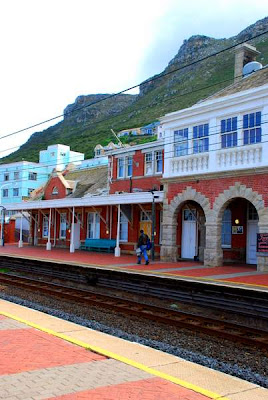With the sun setting in the western sky over the Cape it is hard to not feel hope for a country that is constantly changing. Hope for a future free from the impact of government mandated segregation, the devastation of HIV/AIDS, hunger, extreme poverty and war. South Africa is known as the rainbow nation for its rainbow of people from around the globe but what does the rainbow truly represent? The rainbow in Genesis 9 is a symbol of God’s covenant to never flood the entire earth – to preserve life. I encourage you to join us in praying for Hope, Life and the Goodness of the Lord God Almighty to be known in the land of South Africa.
In the Xhosa language Khayelitsha means, New Home. It is estimated that over 1 million black and colored South African’s live in this informal township. As we drove through the township we didn’t dare get out of the car as crime and theft are part of the profile of every day life here. Driving along the outskirts of the township we kept seeing these improvised and personalized billboards on the walls; messages of hope, change and truth. Spousal abuse, drug addiction, poverty, unclean living conditions, lack of education, violence, rape, incest, teen pregnancy, abortion, HIV/AIDS, death – these are all issues that the residents of Khayelitsha face everyday. Not exactly the kind of New Home you would be longing for when imagining a better future.
It is hard to imagine, but this is the view you see for miles and miles. It is estimated that over 1 million people live in the township of Khayelitsha, which means New Home in the Xhosa language. This is a place where the impact of HIV/AIDS is just a part of the day to day life. It is a place where it is not unheard of for both parents in a home to be deceased and the children are left with an aunt, uncle or grandparent and even sometimes left to raise themselves and younger siblings. Africa alone has over 12 million AIDS orphans.
In Costa Rica drug abuse, prostitution and trafficking of persons are all real everyday issues. Many individuals immigrate to Costa Rica looking for a better future than the one they left behind but often find themselves living on the outskirts of society, rejected and without hope. In an effort to provide for their basic needs such as food and shelter, they often turn to drug dealing and prostitution. These are desperate measures that they have taken in desperate times in order to stay off the streets. Even then they do not always escape the harsh realities of homelessness, hunger, and disease.
In San Jose, the capital city of Costa Rica, it is estimated that there are at least 2,000 child prostitutes. The majority of these young girls are forced into the trade by family and pimps that benefit financially in some way from the girls work. Costa Rica is quickly becoming the Thailand of the America’s with 80% of all sex tourists visiting the country coming from the United States of America. The impact of internet pornography and sexual promiscuity in the US reaches far beyond its own borders and impacts the lives of innocent girls with no hope of escaping from its grasps.
1st Class & 3rd Class…which would you choose. We chose 3rd class because it was less expensive and a comfortable train ride was not our priority. We were often the only white family in this section of the train which was hard not to notice. Once we were even asked if we were in the wrong car. The segregation that one still finds in South Africa is a sign that although Apartheid ended in 1994 the attitudes and racism of that time still exist today. And yet God created us all equal, all in his image, man and woman. Join is praying for a South Africa and world free from racism and a world in which the diversity of our skin tone is seen as part of the beauty of our creator.
The Cape area is known for the rugged beauty of its landscape and indeed it is beautiful. But within the beauty are communities and people who don’t have enough to eat. The ocean is teaming with fish and yet all they can afford is rice. Who will feed the hungry and cloth the naked? Who will answer the cries of the child waiting for its next meal?
A short 10 minute taxi ride from the famously safe and predominately white town of Fish Hoek is the township of Masiphumelele. Violence and crime are part of the culture of this community as witnessed in the play of its children. We all know that children mimic the actions of the adults in their lives. How easily this small child holds his toy gun as he hugs on his friends. It is attitudes of acceptance towards violence that continue to shape the ideas and opinions of South Africa being unsafe and the idea that all people of color are violent and will rob you given the chance. It is a stereotype that of course is only true of a few and we hope that this small boy will not become the next perpetrator of violence in this community.
















































